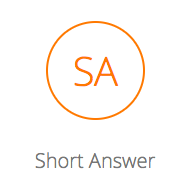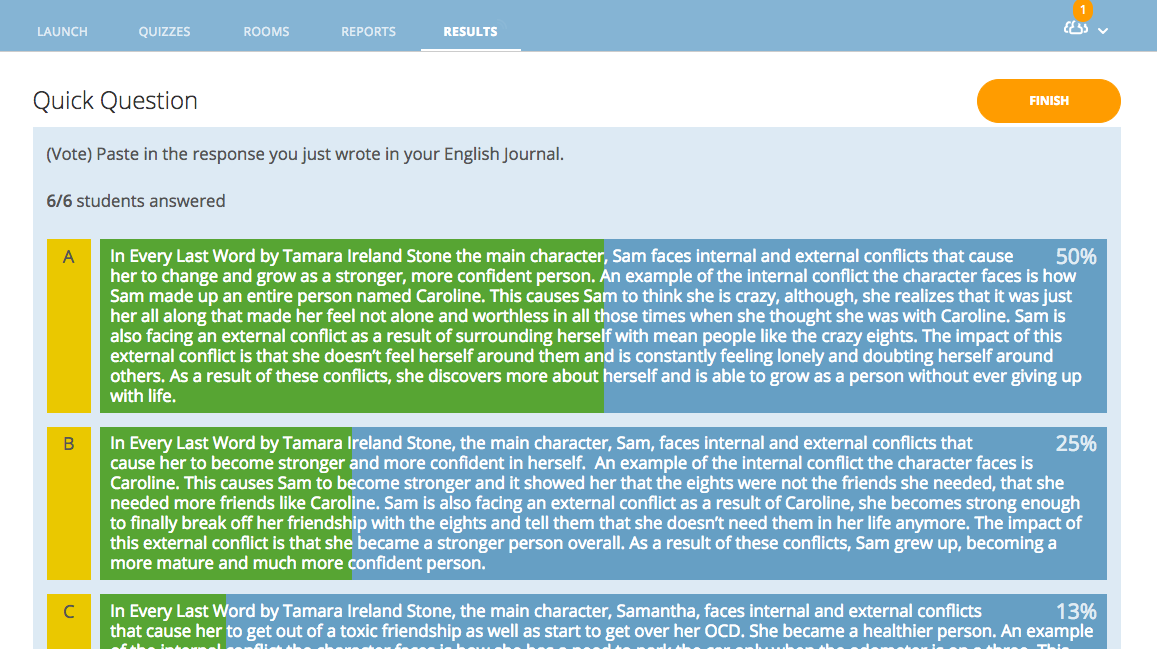Socrative is an app and a website for getting questions out to students. The students need devices to respond, but Socrative is really flexible. It works on smart phones, iPads, laptops and even iPods that have wifi connections. Basically, if a student can access the internet, they can respond to a Socrative question. I've hit upon an interesting and effective writing pedagogy using Socrative. This worked well multiple times last year and I'm now confident about it enough to write about it.

My favorite way to use Socrative is the single question mode that lets me send out a question whenever I need to see student answers. (You can also pre-plan quizzes that are either teacher paced or self-paced.) The single questions can be multiple choice, true false or short answer. It's the short answer questions that help me with writing instruction.
 Say I'm working with my freshmen on a specific skill, like character description, creating a particular mood, or introducing evidence in an essay. I will model the skill, show them several examples and then send out a short answer Socrative question and ask them to try writing their own instance of the skill we are working on.
Say I'm working with my freshmen on a specific skill, like character description, creating a particular mood, or introducing evidence in an essay. I will model the skill, show them several examples and then send out a short answer Socrative question and ask them to try writing their own instance of the skill we are working on.
Students get the question immediately and they all begin crafting their attempt at doing the writing move we are trying. I see their efforts flow onto my screen as soon as they submit them. I can tell right away which students are "getting it" and who needs more help. It's low stakes because they know I'm not grading these, we are just experimenting with a new skill. But then something amazing happens. When all of my students have made their attempt I can send the responses out for a vote. The names get stripped and every student sees what every other student wrote, anonymously. After reading through the responses each student "votes" for his or her favorite example from the answers.
From their votes a handful of answers emerge that are generally (at first) much better than the rest. As a class we read them and talk about why they thought these examples were good. I find students pay much more attention to exemplars written by their peers than they do with other mentor texts.
 Then we do it again, and everybody writes another version of the same skill, and they all get better. That's not hyperbole. Everyone writes better on the second round. We vote again and the pool at the top gets larger, each answer gets fewer votes because the overall quality has improved. Then we do it again. I can usually fit three rounds into a 50 minute class period, with time upfront for my initial instruction. Over the course of that period I can see the growth in my students as they come to understand what we are trying to write and get multiple chances to practice.
Then we do it again, and everybody writes another version of the same skill, and they all get better. That's not hyperbole. Everyone writes better on the second round. We vote again and the pool at the top gets larger, each answer gets fewer votes because the overall quality has improved. Then we do it again. I can usually fit three rounds into a 50 minute class period, with time upfront for my initial instruction. Over the course of that period I can see the growth in my students as they come to understand what we are trying to write and get multiple chances to practice.
Sometimes an answer gets 90% of the vote on the first round. "This is terrible." I say. "That's great if one of you can do this really well, but what about the rest of you? We need to step it up people." Their answers get better and the vote gets more spread out.
Often the answers that rise to the top are not from the students you would expect. I've watched my English Learners and students with IEP's drop their jaws when they see that their classmates voted for their writing. It turns out (in my classroom) that fabulous writing voice is not closely correlated with other forms of academic achievement. The quiet students often have really interesting things to say in their writing.
My students request this activity. They also see the immediate improvement it makes in their writing development. It allows them to rehearse their academic writing skills. And it's fun. It's immediate, but anonymous feedback about the quality of their writing. It's an opportunity to level up quickly. It's also paperless, highly engaging, requires little preparation time from me, and most importantly, very effective.
The data from our end of the year course survey shows that my students saw their own growth as writers, (5=strongly agree). Much of that had to do with the writing assignments we worked on, other scaffolding, and a lot of hard work on revision, but some of it came from our practice with Socrative. I encourage you to give it a try with your own students and let me know how it goes.
Note: This post was originally from 8/2014. In 12/2018 I updated the screenshots to reflect the current Socrative UI.
My favorite way to use Socrative is the single question mode that lets me send out a question whenever I need to see student answers. (You can also pre-plan quizzes that are either teacher paced or self-paced.) The single questions can be multiple choice, true false or short answer. It's the short answer questions that help me with writing instruction.
Students get the question immediately and they all begin crafting their attempt at doing the writing move we are trying. I see their efforts flow onto my screen as soon as they submit them. I can tell right away which students are "getting it" and who needs more help. It's low stakes because they know I'm not grading these, we are just experimenting with a new skill. But then something amazing happens. When all of my students have made their attempt I can send the responses out for a vote. The names get stripped and every student sees what every other student wrote, anonymously. After reading through the responses each student "votes" for his or her favorite example from the answers.
From their votes a handful of answers emerge that are generally (at first) much better than the rest. As a class we read them and talk about why they thought these examples were good. I find students pay much more attention to exemplars written by their peers than they do with other mentor texts.
Sometimes an answer gets 90% of the vote on the first round. "This is terrible." I say. "That's great if one of you can do this really well, but what about the rest of you? We need to step it up people." Their answers get better and the vote gets more spread out.
Often the answers that rise to the top are not from the students you would expect. I've watched my English Learners and students with IEP's drop their jaws when they see that their classmates voted for their writing. It turns out (in my classroom) that fabulous writing voice is not closely correlated with other forms of academic achievement. The quiet students often have really interesting things to say in their writing.
 |
| From our end of the year course survey |
My students request this activity. They also see the immediate improvement it makes in their writing development. It allows them to rehearse their academic writing skills. And it's fun. It's immediate, but anonymous feedback about the quality of their writing. It's an opportunity to level up quickly. It's also paperless, highly engaging, requires little preparation time from me, and most importantly, very effective.
The data from our end of the year course survey shows that my students saw their own growth as writers, (5=strongly agree). Much of that had to do with the writing assignments we worked on, other scaffolding, and a lot of hard work on revision, but some of it came from our practice with Socrative. I encourage you to give it a try with your own students and let me know how it goes.
Note: This post was originally from 8/2014. In 12/2018 I updated the screenshots to reflect the current Socrative UI.

Comments
Post a Comment
Thanks for your comment on this post. If you have an urgent question you may want to reach out to me on BlueSky @jenroberts.bsky.social.
Comments on this blog are moderated for posts more than five days old to cut down on spam, so if you are commenting on an older post it may not appear right away.
If something here helped you, feel free to donate $5 toward my classroom library at https://www.buymeacoffee.com/jroberts1